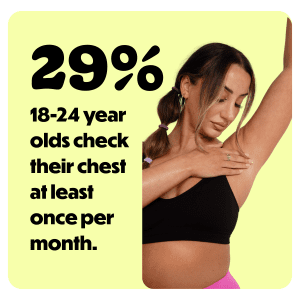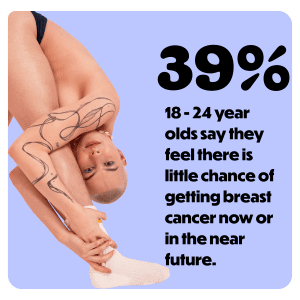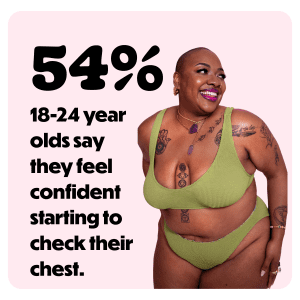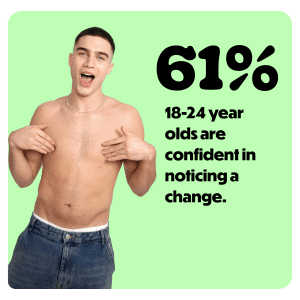Breast cancer and younger people
Whilst breast cancer is less common in younger people under screening age, it still happens.
In the UK:




These statistics show that there’s still work to be done to make sure younger people:
We want to work together, with you, to increase younger people’s awareness, knowledge and confidence on breast cancer and monthly checking. We encourage you to proactively educate younger people to be breast aware and to urgently refer your patients if they present with symptoms, regardless of age.
Our work at CoppaFeel! is focused on closing the health inequity gap for younger people. We exist because they are often neglected from conversations about breast cancer, and experience barriers in accessing healthcare, in relation to referral and diagnosis.
We also know that if our messaging reaches people at a younger age, it’ll improve health outcomes for all people, at any age.
As well as educating all younger people, we prioritise some groups first because there is even more work to be done to close the gap.
Our priority groups are determined by health data, which indicates who is in greatest need of our work. We also look at gaps in health data and where individual, cultural, historical or systemic barriers can make accessing our breast awareness message more difficult.
CoppaFeel! was born from the lived experience of a young person, our founder, Kris.
We were founded in 2009 by Kris Hallenga and her twin sister Maren, after Kris was diagnosed with incurable (stage 4/secondary) breast cancer at the age of 23. Kris was struck by the limited information available for young people, and so, CoppaFeel! was born.
Kris visited her GP multiple times with symptoms of breast cancer, but was dismissed due to her age. She received her diagnosis on her third visit, at which point she was diagnosed with incurable breast cancer.
Her story highlights the importance of promoting breast awareness and education amongst people of all ages. It also shows how vital it is that younger people are taken seriously when they present to their GP with symptoms and aren’t dismissed due to their age.
Kris lived with breast cancer for 14 years and sadly died in 2024. We are committed to honouring her legacy by continuing to spread our chest checking message.
Anyone registered with a GP as female will be invited for NHS breast screening from age 50. Yet we know that 2,500 people under the age of 40 are diagnosed with breast cancer every year in the UK.
Breast screening is not routinely available to younger people on the NHS, as the risk outweighs the benefit, and mammograms are less effective due to their denser breast tissue.
This means that what CoppaFeel!, the NHS and other breast cancer charities refer to as breast awareness – knowing the signs of breast cancer and monthly self-checking, is often the only way for someone under screening age to notice unusual changes.
Many breast cancers are found through self-detected symptoms, and crucially, data tell us that when breast cancer is found early, treatments are more effective and survival rates are higher.
5-year breast cancer survival in England:
However, we also know that awareness, knowledge and confidence amongst younger people around breast cancer is not as high as we’d like it to be.
We’re here to increase your knowledge around the relevance and prevalence of breast cancer in younger people. As well as highlighting the barriers younger people face in accessing healthcare services, specifically in relation to referral and diagnosis.
We work with healthcare professionals as we know you have an important role to play in helping younger people become confident in checking monthly and knowing their normal.
Ensuring you’re well-informed and supported to raise awareness with your younger patients helps us collectively get closer to our goal of all breast cancers being diagnosed early and accurately.
We have a variety of tailored resources for you to share at key touch points with patients. They are specifically designed with younger people in mind, so you can signpost and raise awareness in a way that speaks to them.
We also have free and PIF quality-marked breast cancer information and CPD training to support your learning and development around breast cancer.